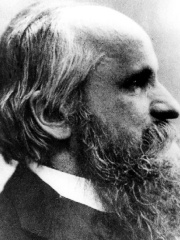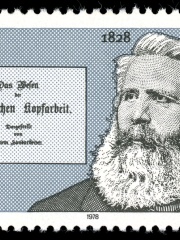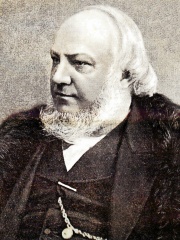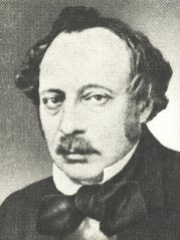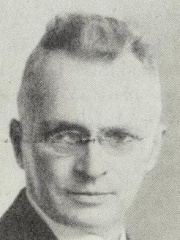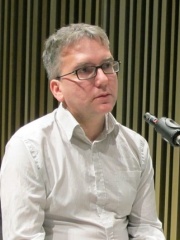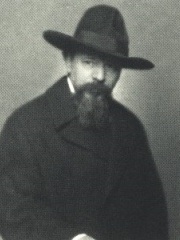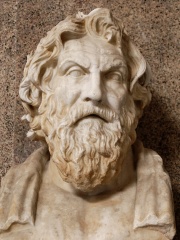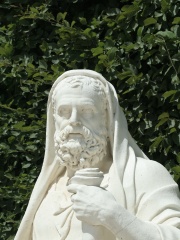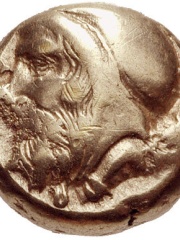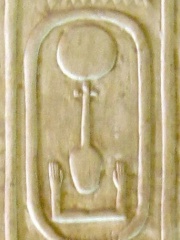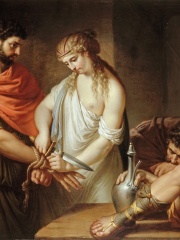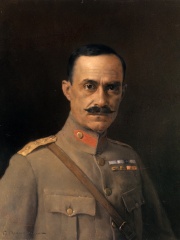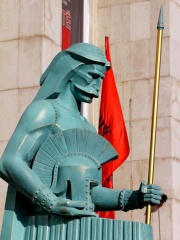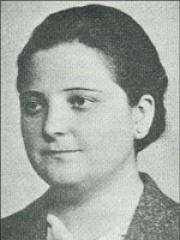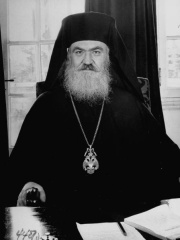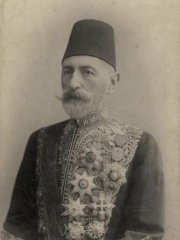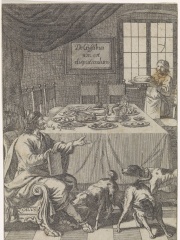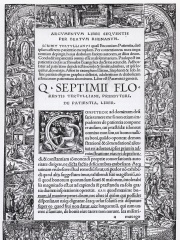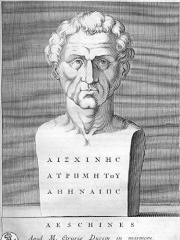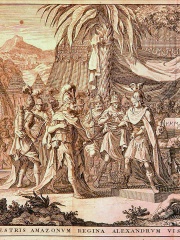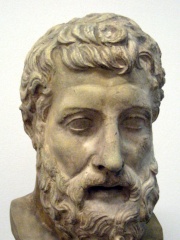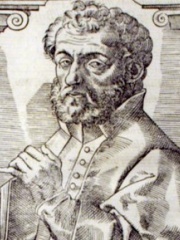Philosopher
Glaucon
445 BC - today

 Glaucon
Glaucon
Glaucon (; Greek: Γλαύκων; c. 445 BC – 4th century BC), son of Ariston, was an ancient Athenian and Plato's older brother. He is primarily known as a major conversant with Socrates in the Republic. According to Debra Nails, two major facts about Glaucon's life can be ascertained from a single comment by Socrates in the Republic, that Glaucon was old enough to have distinguished himself in a battle at Megara, and that he was the eromenos of the poet and statesman Critias. Read more on Wikipedia
His biography is available in 19 different languages on Wikipedia. Glaucon is the 751st most popular philosopher (down from 748th in 2024), the 445th most popular biography from Greece (down from 437th in 2019) and the 49th most popular Greek Philosopher.
Memorability Metrics
Page views of Glaucon by language
Among Philosophers
Among philosophers, Glaucon ranks 751 out of 1,267. Before him are Alexius Meinong, Joseph Dietzgen, Jacob Moleschott, Arnold Ruge, Anathon Aall, and Jean Wahl. After him are Amelius, Mark Fisher, Robert Filmer, Albinus, Asclepigenia, and Theodor Lessing.
Most Popular Philosophers in Wikipedia
Go to all RankingsAlexius Meinong
1853 - 1920
HPI: 62.54
Rank: 745
Joseph Dietzgen
1828 - 1888
HPI: 62.52
Rank: 746
Jacob Moleschott
1822 - 1893
HPI: 62.51
Rank: 747
Arnold Ruge
1802 - 1880
HPI: 62.50
Rank: 748
Anathon Aall
1867 - 1943
HPI: 62.50
Rank: 749
Jean Wahl
1888 - 1974
HPI: 62.47
Rank: 750
Glaucon
445 BC - Present
HPI: 62.46
Rank: 751
Amelius
200 - 300
HPI: 62.45
Rank: 752
Mark Fisher
1968 - 2017
HPI: 62.45
Rank: 753
Robert Filmer
1588 - 1653
HPI: 62.43
Rank: 754
Albinus
100 - 200
HPI: 62.42
Rank: 755
Asclepigenia
400 - 500
HPI: 62.40
Rank: 756
Theodor Lessing
1872 - 1933
HPI: 62.39
Rank: 757
Contemporaries
Among people born in 445 BC, Glaucon ranks 4. Before him are Antisthenes, Lysias, and Tissaphernes.
Others Born in 445 BC
Go to all RankingsAntisthenes
PHILOSOPHER
445 BC - 365 BC
HPI: 78.34
Rank: 1
Lysias
WRITER
445 BC - 380 BC
HPI: 72.87
Rank: 2
Tissaphernes
POLITICIAN
445 BC - 395 BC
HPI: 67.59
Rank: 3
Glaucon
PHILOSOPHER
445 BC - Present
HPI: 62.46
Rank: 4
In Greece
Among people born in Greece, Glaucon ranks 445 out of 1,024. Before him are Agesilaus I (null), Telesilla (-500), Neferkara I (-2780), Aristomenes (-700), Nikolaos Plastiras (1883), and Glaucias of Taulantii (-335). After him are Afet İnan (1908), Damaskinos of Athens (1891), Pavlos Kountouriotis (1855), Asclepigenia (400), Dimitrios Ioannidis (1923), and Turhan Pasha Përmeti (1846).
Others born in Greece
Go to all RankingsAgesilaus I
POLITICIAN
HPI: 62.63
Rank: 439
Telesilla
WRITER
500 BC - 460 BC
HPI: 62.54
Rank: 440
Neferkara I
POLITICIAN
2780 BC - 2800 BC
HPI: 62.48
Rank: 441
Aristomenes
POLITICIAN
700 BC - 660 BC
HPI: 62.47
Rank: 442
Nikolaos Plastiras
POLITICIAN
1883 - 1953
HPI: 62.47
Rank: 443
Glaucias of Taulantii
POLITICIAN
335 BC - 302 BC
HPI: 62.46
Rank: 444
Glaucon
PHILOSOPHER
445 BC - Present
HPI: 62.46
Rank: 445
Afet İnan
HISTORIAN
1908 - 1985
HPI: 62.44
Rank: 446
Damaskinos of Athens
POLITICIAN
1891 - 1949
HPI: 62.41
Rank: 447
Pavlos Kountouriotis
POLITICIAN
1855 - 1935
HPI: 62.41
Rank: 448
Asclepigenia
PHILOSOPHER
400 - 500
HPI: 62.40
Rank: 449
Dimitrios Ioannidis
MILITARY PERSONNEL
1923 - 2010
HPI: 62.40
Rank: 450
Turhan Pasha Përmeti
POLITICIAN
1846 - Present
HPI: 62.36
Rank: 451
Among Philosophers In Greece
Among philosophers born in Greece, Glaucon ranks 49. Before him are Zoilus (-400), Cebes (-500), Aeschines of Sphettus (-430), Aristo of Chios (-300), Onesicritus (-360), and Menedemus (-340). After him are Asclepigenia (400), Hermarchus (-325), Axiothea of Phlius (-400), Hecataeus of Abdera (-400), George of Trebizond (1395), and Metrocles (-400).
Zoilus
400 BC - 320 BC
HPI: 64.73
Rank: 43
Cebes
500 BC - 400 BC
HPI: 64.47
Rank: 44
Aeschines of Sphettus
430 BC - 360 BC
HPI: 64.46
Rank: 45
Aristo of Chios
300 BC - 300 BC
HPI: 64.22
Rank: 46
Onesicritus
360 BC - 290 BC
HPI: 63.05
Rank: 47
Menedemus
340 BC - 265 BC
HPI: 62.70
Rank: 48
Glaucon
445 BC - Present
HPI: 62.46
Rank: 49
Asclepigenia
400 - 500
HPI: 62.40
Rank: 50
Hermarchus
325 BC - 250 BC
HPI: 62.27
Rank: 51
Axiothea of Phlius
400 BC - 400 BC
HPI: 61.88
Rank: 52
Hecataeus of Abdera
400 BC - 300 BC
HPI: 61.49
Rank: 53
George of Trebizond
1395 - 1472
HPI: 61.49
Rank: 54
Metrocles
400 BC - 300 BC
HPI: 61.36
Rank: 55
